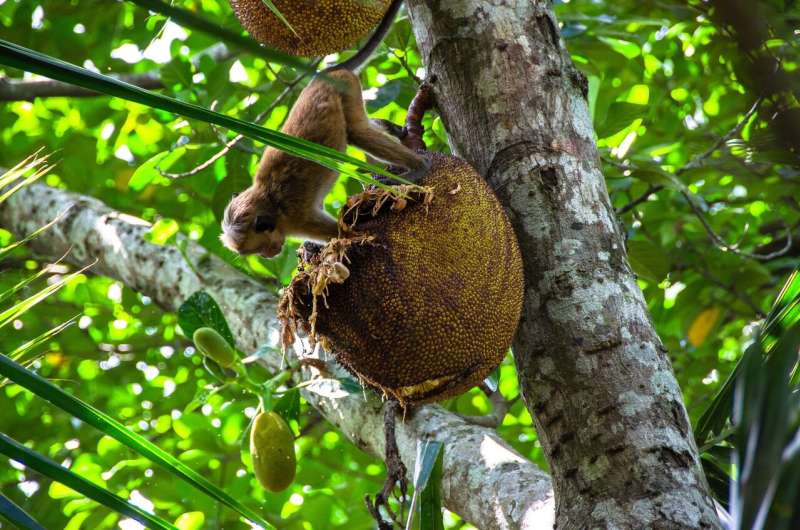Monkeys like alcohol at low concentrations, but probably not due to the calories

Fruit-eating monkeys show a preference for concentrations of alcohol found in fermenting fruit, but do not seem to use alcohol as a source of supplementary calories, according to a study by researchers from Linköping University, Sweden, and the Universidad Veracruzana, Mexico. The findings do not support the idea that human alcoholism originated from a predilection of primates for alcohol-containing overripe fruit.
When overripe fruit is fermented by microbes, alcohol is produced. Some research has suggested that fruit-eating monkeys use this dietary ethanol as a source of supplementary calories. The researchers behind the new study, which is published in Chemical Senses, set out to test this idea.
In a first experiment performed at a field station in Mexico, the researchers presented eight spider monkeys with varying concentrations of ethanol naturally found in fermenting fruit (0.5–3 percent) and tap water as the alternative. They found that the animals were able to detect ethanol at concentrations as low as 0.5 percent. In comparison, the detection threshold of humans for this alcohol is 1.34 percent. The monkeys preferred all ethanol concentrations up to 3 percent over water.
"These results demonstrate that fruit-eating spider monkeys are extraordinarily sensitive to the taste of ethanol. We also found that they prefer this alcohol when presented at naturally occurring concentrations found in fermenting fruit," says Professor Matthias Laska at the Department of Physics, Chemistry and Biology (IFM) at Linköping University.
In a second experiment, the spider monkeys were given the choice between a sugar solution spiked with ethanol and an equally concentrated sugar solution without ethanol. Here, the animals clearly preferred the ethanol-spiked sugar solution. However, when presented with an ethanol-spiked sugar solution and a higher-concentration sugar solution without ethanol, the animals clearly preferred the pure sugar alternative, even when the sugar-ethanol mixture contained three times more calories.
A similar experiment was performed in which the spider monkeys were given the choice between puréed fruit spiked with ethanol and puréed fruit without ethanol. The tests with sugar solutions and with puréed fruit that were either spiked with ethanol or not, suggest that sweetness, and thus carbohydrate content, may be more important for the preferences displayed by the spider monkeys than the calories provided by ethanol.
"The findings, therefore, do not support the idea that dietary ethanol is used by fruit-eating primates as a source of supplementary calories. Similarly, the findings do not support the idea that a predilection of non-human primates for alcohol-containing overripe fruits reflects the evolutionary origin of human alcoholism," says Matthias Laska.
More information: Taste responsiveness of spider monkeys to dietary ethanol, Chemical Senses, 11 August 2019, DOI: 10.1093/chemse/bjz049
Provided by Linköping University





















